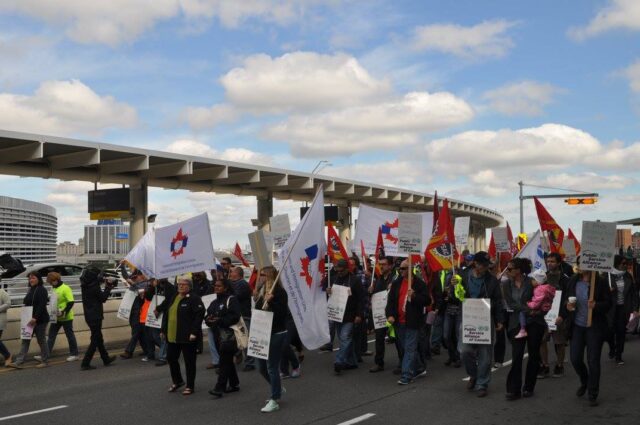It has been some time since we have provided an update to our members with respect to those of you who cannot take the CDT and Arming course based on a ground listed in the Canadian Human Rights Act (CHRA) or who have tried and been unable to successfully complete the course.
Much has transpired since last April when the CBSA issued its Letters of Confirmation. The CBSA remains fixed on having only tooled/armed members with face to face enforcement duties working on the front line. While the CIU/PSAC disputes that the employer has established this as a bona fide occupational requirement, we are nonetheless working with the CBSA to ensure that our members are treated fairly.
With that in mind, the CBSA and CIU/PSAC (CIU National Executive: Mark Weber, Brea Lewis, André Beaulieu, Chantal Rajotte and myself as well as CIU National EO Representative Murray Star, PSAC Legal Officer Lisa Addario and CIU Labour Relations Officer Laurel Randle) have been working to establish a strategy for the placement of the CBSA employees/CIU members who require accommodation or placement for reasons outlined in the first paragraph above.
We first worked to agree on some principles. In the meantime, the employer undertook to have regional management and human resources compile preliminary lists of employees who hold front line positions and who need to be accommodated under the CHRA, and to look at placement opportunities for these employees within those regions.
The CBSA has asserted that our members who are already in accommodated positions that do not involve face to face enforcement interactions with clients will remain in those positions.
For those employees who are in face to face enforcement positions, have limitations that are at least twelve months in duration and who will require accommodation by the March 31, 2016 arming implementation deadline, accommodated positions will be offered to them at their substantive level. This accommodation will be negotiated on a case by case basis. The employer has asserted that it has sufficient meaningful work for all these employees.
Under federal law, the employer has a duty to accommodate employees to the point of undue hardship and CBSA recognizes this obligation.
The CIU will be monitoring this process closely. We must also make sure that the list of employees compiled by the employer is comprehensive.
We have asserted that the employer ought not to be offering our members demotions in this process and the principle agreed to by the CBSA is to find positions that are at the members’ substantive group and level.
With the above principles established, the parties agreed to a pilot for Southern Ontario Region within the Border Services Officer community. During the third week in August, CBSA management met with CIU representatives in Niagara Falls. Preliminary discussions were held wherein the CBSA brought forward the names of our members impacted as well as potential placement opportunities. Initially, the next step was for CIU representatives to meet with members individually to discuss their particular needs and options. However – and because we recognized that once such discussions would start, news would certainly spread and questions would abound – it was decided that before taking that step we would provide our membership with this piece of communication to inform them of the strategy and the meetings that will take place over the coming months.
The SOR Branch Presidents, National Vice-President for that region and CIU/PSAC staff members as required will meet in the near future with the impacted members individually. Subsequently, the employer, employee and Union representatives will meet so that accommodation arrangements can be determined.
Once the pilot in SOR is reviewed, such meetings will take place across the country, with the next region being the Atlantic. A schedule will be made available for the remainder of the country (before the end of September).
As a party to the accommodation process, the Union’s obligation is to not block a reasonable accommodation plan. The employer intends to canvass employees who currently meet the use of force requirements and are not in front line positions, inviting them to consider other positions in this regard so as to ensure continued employment opportunities for those members who require an accommodation in an unarmed/untooled position.
CIU and PSAC will be making every effort to ensure that the transition is as smooth as possible. If you have any questions regarding the above, please see your union representative or Branch President.















